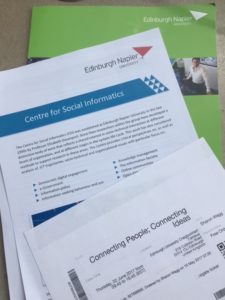Last month I was fortunate enough to win a travel bursary to attend the Connecting People, Connecting Ideas (CPCI) research symposium at Edinburgh Napier University. Organised by colleagues at the Centre of Social Informatics at Edinburgh Napier, the symposium provided an opportunity for those with research interests in Information Science to come together and consider research priorities and future collaborations in this area.

For me as someone early in their PhD career, it was a perfect opportunity to meet PhD students, Early Career Researchers and academics from a spread of disciplines – including Business, Computing, Information Science, Librarianship, and Sociology – who have a mutual interest in information science, and more specifically information behaviour, information literacy and digital inclusion.
It was clear from the very beginning this was going to be an insightful event. Before the event delegates were invited to complete a pre-symposium exercise by listing three research priorities in Information Science that related to everyday life information seeking and information behaviours in online environments to help determine the agenda for the day.
The day kicked off with an excellent keynote presented by Professor Simeon Yates, Director of the Institute of Cultural Capital at Liverpool University. I was particularly keen to hear Simeon’s talk as I knew it linked with my PhD research, but also work conducted by my previous employer, Good Things Foundation and Simeon, who recently published a report entitled: The real digital divide? Understanding the demographics of non-users and limited users of the internet: an analysis of Ofcom data.
The focus of Simeon’s keynote was the ESRC-funded project Ways of being in a digital age. Commissioned to help identify and prioritise future areas and methods for research on the social, economic, political, psychological and cultural impacts of digital media and technologies, the project is led by Simeon and consists of a team of academics from eight UK universities and an international steering group.
Simeon outlined the research activities undertaken through the project and emphasised that to understand ‘digital’ there is a need for interdisciplinary research, including information science, to gain insight from a variety of perspectives, but with this comes inherent challenges. Simeon talked about social class inequalities, the digital divide and the digitally superserved and underserved, referring to recent Ofcom data, and provided an interesting argument on how peoples behaviour with digital replicates existing social class inequalities. The slides from Simeon’s presentation can be found on SlideShare and a more detailed summary of Simeon’s presentation can be found on Sheila Webber’s Information Literacy Blog. I look forward to seeing the final project report due to published this summer.
Simeon’s keynote was followed by three group work activities – one before lunch and two after. The first session involved looking at some of the research ideas submitted prior to the event which had been grouped into broad themes.
By the end of the day these broad themes had been reduced to three topics: information seeking and risk; social and policy implications of filter bubbles; and visuals. This was achieved with support by four facilitators; Mike Chantler: Professor of Computer Science, School of Mathematical and Computer Sciences, Heriot-Watt University, Scotland; Brian Detlor: Professor and Chair in Information Systems, DeGroote Business School at McMaster University, Ontario, Canada; Annemaree Lloyd: Professor in Library and Information Science, Swedish School of Library and Information Science, University of Borås, Sweden; and Wendy Moncur: Interdisciplinary Professor of Digital Living, University of Dundee, Scotland
The final plenary involved each group presenting how they had refined their research topic and developed three research questions.
For me this was such an inspiring day as it enabled everyone to contribute to discussions on specific topics, guided by questions designed to prompt discussion on turning a research idea into a research question and how this might be developed into a research proposal. The fact that so much progress on research ideas could be made in one day was incredible.
I would like to say a massive thank you to Edinburgh Napier University and Loughborough University for funding my travel to the event, and to Frances Ryan, Hazel Hall and colleagues at Edinburgh Napier for organising and hosting such an inspiring, thought-provoking event. Hazel Hall provides an excellent review of the event.
